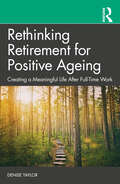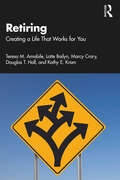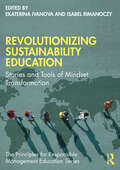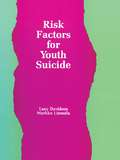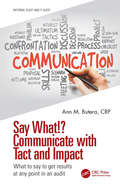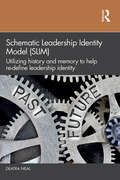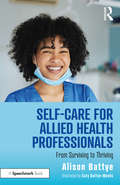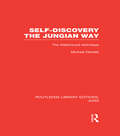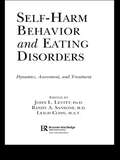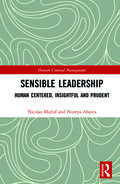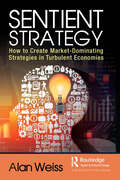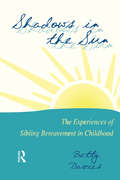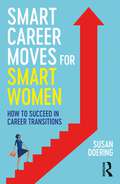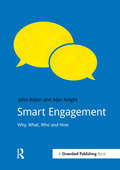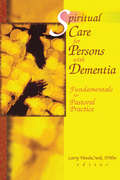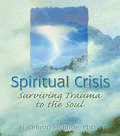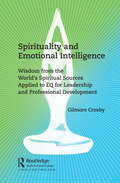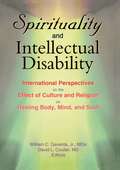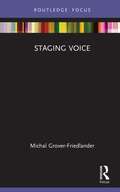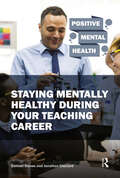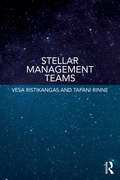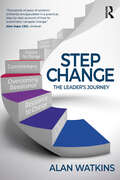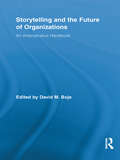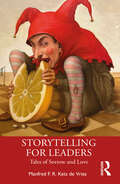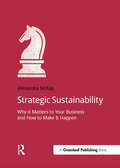- Table View
- List View
Rethinking Retirement for Positive Ageing: Creating a Meaningful Life After Full-Time Work
by Denise TaylorRethinking Retirement for Positive Ageing is a practical guide that shows you how to make retirement successful, based on the most up-to-date research available. It encourages a deeper and wider view of retirement and reveals how retirement can be a time of transition, renewal, and re-imagination. Written by career coach Dr Denise Taylor, it considers the psychological factors that impact a successful adjustment to retirement and offers a deeper analysis of how people can find meaning and purpose after full-time work. It examines retirement as an event that often brings about great changes in a person’s personal and social life, and how to move forward with meaning in life. Illustrated with interviews, activities, and case studies, and with exercises and questions for reflection, it covers key topics including identity, health, well-being, finances, and relationships. This insightful guidebook is for all prospective and current retirees as well as employers, careers professionals, and counsellors who want to help people reflect on their approaches to retirement. You can visit the website at https://denisetaylor.co.uk/rethinking-retirement/
Retiring: Creating a Life That Works for You
by Kathy E. Kram Douglas T. Hall Teresa M. Amabile Lotte Bailyn Marcy CraryRetirement, as a major life transition, can be both thrilling and challenging in unexpected ways. Written by acclaimed authors in the fields of business leadership, careers, and work, this book goes beyond the typical financial and health-related advice on retirement, providing insights to guide you in broader areas of your life – identity issues, relationship challenges, and questions about creating a new retirement life structure that works for you. With lively, engaging writing, the book tells the detailed retirement transition stories of 14 people – and draws on over 200 interviews with 120 people – to explore how retiring involves a reconstruction of both the person and their life structure. You’ll gain wisdom on the common themes and the wildly different approaches people take to the four big tasks of retiring: making the retirement decision, detaching from work both tangibly and psychologically, building a new life structure for retirement, and settling into a relatively stable retirement life – but prepared to restructure again as life unfolds into the future. Throughout each chapter, you’ll see how the dynamic interplay of self, life structure, and external context affect a retiring person’s day-to-day experience in the final months of their career, as well as their early years of retirement – and how life satisfaction depends largely on alignment among the three. At the same time, you’ll learn how family, friends, and colleagues, as well as the organization the person is retiring from, can play a crucial role.This book is for you if you are seeking deep, nuanced insight into – and practical advice on – the psychological, social, and life-restructuring aspects of retirement that can make all the difference for life satisfaction. It is also for you if you are a family member or friend of a retiring person, a helping professional, or an organizational leader who cares about your older workers and the value they bring to your organization even as they depart.
Revolutionizing Sustainability Education: Stories and Tools of Mindset Transformation (The Principles for Responsible Management Education Series)
by Ekaterina Ivanova and Isabel RimanoczyThere is growing awareness among leading responsible management scholars and practitioners that understanding global wicked problems is insufficient in effecting lasting engagement and changed behaviors. Research indicates that to impact behavior, the mindset has to shift, which leaves the question: How do you shift a mindset? This book guides educators and practitioners, their students and colleagues to take action on finding urgent solutions to the grand challenges stated in the 17 UN Sustainable Development Goals. A Sustainability Mindset is a way of thinking and being that results from a broad understanding of the ecosystem, from social sensitivity and an introspective focus on our personal values and higher self, which finds its expression in actions for the greater good. By promoting a mindset shift, educators in very diverse contexts are laying the foundation for a resilient future. The book presents a collection of over 150 student voices depicting a transformative experience and a shift in their mindset. Seventeen educator/student teams of contributing authors from across five continents describe the activity that prompted those students’ reflections, and the conceptual frameworks that played a role in the selection of the learning goals and activities. The book is written with academic and corporate educators, reflective practitioners, consultants, coaches, trainers and students in mind, and is invaluable in guiding the process of developing a sustainability mindset among participants in the training process.
Risk Factors for Youth Suicide (Death Education, Aging and Health Care)
by Lucy Davidson Markku LinnoilaFirst published in 1990. Routledge is an imprint of Taylor & Francis, an informa company.
Say What!? Communicate with Tact and Impact: What to say to get results at any point in an audit (Internal Audit and IT Audit)
by Ann M. ButeraThis book addresses the important role of communication within the context of performing an audit, project, or review (i.e., planning, detailed testing, and reporting). Intended for audit, information security, enterprise, and operational risk professionals at all levels, including those just starting out, Say What!? Communicate with Tact and Impact: What to Say to Get Results at Any Point in an Audit contains an array of practical and time-tested approaches that foster efficient and effective communication at any point during an engagement. The practical and memorable techniques are culled from author Ann M. Butera’s CRP experience as a trusted advisor who has taught thousands of professionals how to develop and hone their interpersonal, communication, and empathic skills. Those familiar with the Five Tier Competency ModelTM she developed will recognize these techniques as a deep dive on the competencies comprising Tier 3: Project Management and Tier 5: Managing Constituent Relations. The author discusses the following behaviors in one’s dealings with executives, process owners, control performers, and colleagues: Demonstrating executive presence Becoming the trusted advisor Influencing others Communicating with tact, confidence, and impact Facilitating productive meetings and discussions Overcoming resistance and objections Managing and resolving conflict Knowing when to let a topic go and move on This book is a guide for professionals who want to interact proactively and persuasively with those they work with, audit, or review. It describes techniques that can be used during virtual, in-person, telephone, or video conferences (as opposed to emails, workpapers, and reports). It provides everyone (newer associates in particular) with the interpersonal skills needed to (1) develop and build relationships with their internal constituents and clients, (2) facilitate conversations and discussions before and during meetings, and (3) handle impromptu questions with confidence and executive presence and make positive first impressions. The topics and techniques discussed are accompanied by case studies, examples, and exercises to give the readers the opportunity to develop plans to bridge the gap between theory and practice. The readers can use the book as a reliable resource when subject matter experts or training guides are not readily available.
Schematic Leadership Identity Model (SLIM): Utilizing History and Memory to Help Re-define Leadership Identity
by Deatra L NealA workbook for leaders who desire to be more effective and deliberate in their leadership identity and for young leaders coming into their own, this book introduces a unique two-step process to understand and define your leadership identity. While some leadership frameworks operate under static concepts of what makes a good leader, the Schematic Leadership Identity Model (SLIM) offers new and seasoned leaders an opportunity to explore the anchoring of who they are and the ebbs and flows of their attitudes and behaviors through life’s changes and experiences. The SLIM framework has two main footings of its seven phases: revolution, which is the recognition of one’s identity journey, and the theoretical constructs that help frame the process and evolution, a series of assignments and journal entries that helps each leader acknowledge their current leadership identity, unravel habits and behaviors that may not align with their idealized self, and redefine their leadership identity based on their findings and whom they aspire to be. The evolutionary design is a system necessary to be revisited as a leader goes deeper into their memories and experiences. This framework helps unearth unconscious and implicit biases that can hinder a leader’s social and cultural capital. No matter the industry or discipline, SLIM offers leaders a self-guided process of discovery that can profoundly examine the root causes of behaviors and attitudes to create meaningful change within themselves that can produce significant positive changes in their teams and organizations.
Self-Care for Allied Health Professionals: From Surviving to Thriving
by Alison BattyeSelf-Care for Allied Health Professionals brings together a collection of self-care strategies into one easy-to-read volume, supporting Allied Health Professionals to do the best for their patients by caring for themselves. The book offers information and practical strategies to look after your physical and emotional wellbeing at home and in the workplace, exploring topics such as sleep and food, resilience and meditation, stress, conflict and adversity. Written to be a flexible tool that can be read cover to cover or dipped in and out of as needed, it offers rapid response self-care strategies alongside more lasting changes, supporting practitioners to make small steps to build healthy habits for the future. Key features of this book include: –– A combination of quick response strategies, like a five-minute breathing exercise you can use before a difficult meeting, and opportunities for deeper work, examining your purpose and aligning your role with your values. –– Combines ancient practices of meditation and mindfulness with the latest research on nutrition, exercise, sleep and wellbeing. –– Consideration of the challenges professionals face in the context of pandemics and a changing health and social care landscape, helping you to thrive in a challenging world. Self-care has never been more important. This is a book that every Allied Health Professional and trainee should have on their desk, to improve productivity, enhance job satisfaction and build resilience for whatever the future brings.
Self-Discovery the Jungian Way: The Watchword Technique (Routledge Library Editions: Jung #4)
by Michael DanielsClearly and entertainingly written, this book presents an exciting new technique of self-analysis. Based on the psychological theories of C.G. Jung, the ‘Watchword’ technique will enable you to identify your psychological type and to explore the structure and dynamics of your personality. As you learn to recognize the various forces and tendencies within the psyche, you will acquire greater understanding of your inner self and your personal relationships. This practical method of self-exploration guides you systematically along the difficult path towards the ultimate goal of self-realization or individuation. It uses a structured form of word association which you assess and interpret yourself, following simple guidelines that require no numerical scoring. Easy to understand and fun to use, the book makes an intriguing and useful introductory guide to Jungian analytical psychology. It will appeal to a wide range of readers, including professional psychologists and students of psychology, counsellors and psychotherapists, as well as anyone interested in self-exploration and personal growth.
Self-Harm Behavior and Eating Disorders: Dynamics, Assessment, and Treatment
by Ph. D. Leigh Cohn Randy A. Sansone John L. Levitt M. A. T.The number of eating disorders patients presenting with symptoms of self-harm is growing quickly, and yet there is surprisingly little known about this unique population. Self-Harm Behavior and Eating Disorders explores the prevalent but largely uncharted relationship between self-injury behaviors and eating disorders symptoms. In the first major book to focus on this area, a renowned group of international scholars and practitioners addresses the subject from a variety of theoretical and practical perspectives. The book is categorized into sections covering epidemiology, psychodynamics, assessment, and a final section covering potential treatment options, including dialectical behavioral therapy, cognitive therapy, interventions strategies, group therapy, and pharmacological approaches. This unrivaled collection of case studies, theoretical exploration, and practical application forms a benchmark for the field, and offers a stepping-stone for new research and innovative treatment strategies. In an area with little available information, previously spread out among diffuse sources, this volume represents the state-of-the-field resource for anyone working with complex eating disorders patients.
Sensible Leadership: Human Centered, Insightful and Prudent (Human Centered Management)
by Nicolas Majluf Nureya AbarcaThis Leadership book is part of the Human Centered Book Trilogy, the 2021 volumes of the Routledge Human Centered Management HCM Series. HCM books are pioneering transformation from the traditional humans-as-a-resource approach of the industrial past, to the humans at the center management and organizational paradigm of the 21st century. HCM is built on the talent and wellbeing of people in the workplace driving work engagement, quality standards, high performance and productivity for long-term organizational sustainability in the global VUCA (volatile, uncertain, complex, ambiguous) environment. This book was carefully crafted by recognized human centered scholars emphasizing the need for a new type of leader responsive to challenges of the knowledge age, global connectivity and instant communications. The book displays a comprehensive framework for the transformation of common individuals into sensible leaders with high capacity to improve organizational culture using Soft Skills to meet critical responsibilities. Sensible leaders are human centered, insightful, prudent, focused on the needs and feelings of followers. They are integral and ethical leaders serving as guides, coaches and mentors, not forcing followers but perceiving clues and responding promptly to solve organizational challenges. They perform honorably in personal and work environments always caring for the common good. This and its two complementary titles Human Centered Organizational Culture: Global Dimensions and Soft Skills for Human Centered Management and Global Sustainability are timely readings for leaders, managers, researchers, acdemics, practitiones, students and the general public working in organizations across industries and sectors wordwide pursuing quality standards, organizational transformation and sustainability.
Sentient Strategy: How to Create Market-Dominating Strategies in Turbulent Economies
by Alan WeissNo pre-pandemic strategy is effective anymore. None. Not for organizations large or small, for-profit or non-profit, domestic or global. Claims of a "return to normal" or "the new normal" are ridiculous. What we’re facing is really a "new reality," and that reality is the need for agile strategic decisions and pragmatic views of the future. That means that strategy formulation can be reduced to a few days and the view of the future can only be 12–18 months. This is the antithesis of Peter Drucker’s approach to strategy, but his highly effective approach was developed at GM three quarters of a century ago. It’s time to move on. Alan Weiss has developed an original and completely new approach to strategy which thus far has certified over 100 people globally, delivering this approach to scores of firms of all types in four countries. More than two dozen firms are using this approach. Sentient Strategy is based on two modern dimensions: awareness of the environment in which the organization exists and has influence, and consciousness of the impact of actions being considered. The old SWOT (strengths, weaknesses, opportunities, threats) approaches are currently equivalent to riding down the freeway on a horse. We must drop the hubris that has led us to believe we can see years ahead and anticipate what’s coming. No one predicted the Internet No one predicted the latest pandemic. It’s time to turn volatility and disruption on their heads and use them as offensive weapons in the marketplace instead of trying to protect ourselves from them. Imagine a strategy that an organization can formulate in just a day or so, revisit easily and frequently, and design a series of shorter-term, viable futures. "Sentient" means "perceptive" and "self-aware." It doesn’t mean "one size fits all" from a cookie-cutter firm’s approach to strategy. Alan Weiss equips the reader to consider using this approach independently. These are new times—a new reality, a "no normal™"—hence, it’s ridiculous to use old approaches to strategy. There’s a clear reason why Sears didn’t morph into Amazon and why Hertz surrendered its number one spot to Enterprise.
Shadows in the Sun: The Experiences of Sibling Bereavement in Childhood (Series in Death, Dying, and Bereavement)
by Betty DaviesShadows in the Sun covers the immediate, short- and long-term responses and subsequent generational effects of sibling bereavement and discusses sibling responses in the context of the variables which influence them. The final chapter synthesizes all that has gone before into a comprehensive model of sibling bereavement. Practical guidelines are offered for those who seek to help grieving siblings, children, and families.
Smart Career Moves for Smart Women: How to Succeed in Career Transitions
by Susan DoeringWritten for the businesswoman and professional, this book offers insights and guidance on making the right decisions about career paths and shows ways to strategically prepare for a career transition, be it a promotion, change of sector, setting up one’s own business or even changing careers altogether. Women are looking more and more at a change of work set-up (to ‘at home’ and hybrid models) and what they want out of their careers and wider life. In easy-to-follow steps, this book demystifies the unwritten rules of making a successful career transition. The reader is provided with a highly practical guide to navigating professional changes at all career points and of all types – as well as a toolkit to facilitate the practice of these new skills and approaches. The book encourages professional women to stop, reflect, and do the groundwork on where they want their career to go. It provides the tools to identify what they want, prepare for change, and cultivate the necessary skills and self-confidence key to a successful career transition. The insights and actionable steps contained in this book make it an invaluable resource for professional women looking to achieve success and navigate the transitional stages of their career, re-enter the workplace after a career break, or who simply want to develop the tools and skills to make smart career moves.
Smart Engagement: Why, What, Who and How (Doshorts Ser.)
by Alan Knight John AstonBusinesses that thrive in the 21st century will be those that are smart about "engagement". These businesses are the best at adapting to changing societal concerns, expectations, risks and opportunities and they know how to generate sustainable outcomes.However, while many companies talk a lot about stakeholder engagement, very few do it in a way that genuinely contributes to business success. In many cases companies engage the wrong people on the wrong issues at the wrong time; they plan too much and do too little; they slide into PR-mode or they undermine relationships by creating expectations that can't be met.Smart Engagement can help you plan an engagement programme that is integrated into your core business. John Aston and Alan Knight draw on nearly 50 years of practical expertise in the field of natural resources, energy and infrastructure, chemicals, aeronautics, the financial sector, environmental management, social responsibility and capacity building. They distil the best from current research and offer a robust guide to best practice. This is not abstract process guidelines; it is a straightforward, no-nonsense and practical approach to engagement, focused on results and value creation.
Spiritual Care for Persons with Dementia: Fundamentals for Pastoral Practice
by Larry Van De CreekSpiritual Care for Persons with Dementia explores spirituality in those with dementia to enrich our understanding of the neurological and psychological aspects of hope, prayer, and the power of belief. You will discover how your ministry is vitally relevant to the clinical well-being and quality of life of people with Alzheimer's disease. Spiritual Care for Persons with Dementia provides you with a model spiritual care program for long-term facilities that supplies you with ideas you can implement in your own ministry.You will learn to avoid cognitive pastoral care method that can be hurtful to those suffering with dementia by using new approaches found in Spiritual Care for Persons with Dementia. This book provides you with suggestions about how to spiritually care for people with dementia. These important recommendations include:understanding the value of pastoral contact when ministering to people with a loss of cognitive functions and memorydiscovering the Progressively Lowered Stress Threshold psychosocial model (PLST) that can make important contributions by enhancing the quality of life for people with dementiaproviding pastoral care using nonverbal methods to overcome the barriers of cognitive dysfunctionexploring a client's cognitive and emotional reality on a daily basis to determine how to best interact with him or her gaining insight into how a thorough analysis of the illness and personal religious history can assist in planning religious activities that provide comfort and solace for people with dementia and their familiesSpiritual Care for Persons with Dementia describes religious, theological, and psychodynamic perspectives that will help you to offer better spiritual care for people with dementia. Using your newly acquired skills from Spiritual Care for Persons with Dementia, you will be more effective when ministering to people with Alzheimer's Disease and to their families.
Spiritual Crisis: Surviving Trauma to the Soul
by J Lebron McbrideIt’s no revelation that in today’s world many people suffer from some form of spiritual crisis. But, fortunately, there is hope. In Spiritual Crisis: Surviving Trauma to the Soul, you’ll discover how you can reverse the impact of spiritual crisis and apply healing balm to the traumatized soul. A comprehensive, real-life approach to spiritual care, it gives you the understanding necessary to put a lid on the daily chaos that seeks to destroy those whose lives have been shattered by tragedy, terror, and disillusionment.Written from the perspective of a compassionate professional who has navigated the dark and turbulent waters of his own spiritual crises, Spiritual Crisis represents a loving cross-section of aid from the fields of pastoral theology, psychology, and health care. Christians and non-Christians alike will benefit from its frank approach to aiding troubled souls through the tough times of belief transition, loss of faith, and potentially damaging extremes in living and thinking. Specifically, you’ll read about: understanding the effects and roots of spiritual crisis and trauma coping with loss counteracting disillusionment with the church negotiating belief transitions dealing with religious burnout intervening in denominational identity crisesOftentimes, it’s hard to know what will make a loved one survive or succumb to the impact of seemingly insurmountable personal emergencies. However, this book is a “call to care” that will enable you to help others turn back the tide of debilitating hardship in their lives and restore the tempering unity of mind and body. Whether you’re a beginning pastoral counselor, a marriage and family therapist, or friend of a troubled loved one, Spiritual Crisis will show you and those you work with how to turn crisis into care.
Spirituality and Emotional Intelligence: Wisdom from the World’s Spiritual Sources Applied to EQ for Leadership and Professional Development
by Gilmore CrosbyThis book weaves together spirituality and a systemic version of emotional intelligence that incorporates Kurt Lewin’s social science and other sources. Emotional intelligence calls on us to be fully present “to the moment.” It calls on us to be appreciative of ourselves and our relationships. Likewise, a calm and compassionate presence is almost universally recognized as a spiritual way of being. In other words, the overwhelming majority of the world’s spiritual sources call on us to be emotionally intelligent and that link is explored with unique clarity in this simple yet powerful text. We are all reactive at times. Becoming more objective and less attached allows us to feel our feelings without being a prisoner to acting on them in habitual ways. From a more detached perspective, feelings are neither good nor bad, but simply clues as to how we are perceiving our environment, especially our social environment. This is especially important in terms of our relationships at work. Our perceptions about what people intend trigger our emotional reactions. Think about the difference when you perceive critical feedback as a sincere attempt to help or when you perceive it as an attack of some sort. Perception evokes different emotional responses. Objectivity about our own perception is even more important than objectivity about emotion, because the former usually precedes the later. Paradoxically, being detached allows one to appreciate and experience one’s emotions more fully. Recognizing emotion as part of your inner guidance system instead of as something dangerous that must be controlled or denied is freeing. The less emotion runs you, the more you can accept feeling what you feel. Emotion is a form of physical energy. Fighting your own feelings takes energy. Allowing the ebb and flow of emotion is essential to physical and emotional health and to accepting ourselves as we are.
Spirituality and Intellectual Disability: International Perspectives on the Effect of Culture and Religion on Healing Body, Mind, and Soul
by William C Gaventa David CoulterLearn about inclusive religious practices from around the world!With a multidisciplinary and anthropological perspective, Spirituality and Intellectual Disability: International Perspectives on the Effect of Culture and Religion on Healing Body, Mind, and Soul takes a fresh, innovative look into the world of religious and spiritual practices for the intellectually disabled. Containing vital insights from the first strand on spiritualit and disability at the quadrennial conference of the International Association for Scientific Study of Intellectual Disability (Seattle, 2000), this book provides a framework for bridging the gap between science and faith. It explores the ways in which faith traditions, cultural backgrounds, and professional roles can help bring about a consensus about what spiritual health means within specific cultures and faiths and across disciplines. This informative book examines and provides cutting-edge information on: recognition of spirituality in health care defining and assessing spirituality and spiritual supports perspectives on intellectual disability from Judiasm, Islam, Roman Catholicism, and Native American spirituality creative models of community ministry and religious education liturgical celebrations with people who have severe mental disabilities
Staging Voice (Routledge Voice Studies)
by Michal Grover-FriedlanderStaging Voice is a unique approach to the aesthetics of voice and its staging in performance. This study reflects on what it would mean to take opera’s decisive attribute—voice—as the foundation of its staged performance. The book thinks of staging through the medium of voice. It is a nuances exploration, which brings together scholarly and directorial interpretations, and engages in detail with less frequently performed works of major and influential 20th-century artists—Erik Satie, Bertolt Brecht and Kurt Weill—as well as exposes readers to an innovative experimental work of Evelyn Ficarra and Valerie Whittington. The study is intertwined throughout with the author’s staging of the works accessible online. This book will be of great interest to students and scholars in voice studies, opera, music theatre, musicology, directing, performance studies, practice-based research, theatre, visual art, stage design, and cultural studies.
Staying Mentally Healthy During Your Teaching Career (Positive Mental Health)
by Jonathan Glazzard Samuel StonesThe mental health of teachers in school is just as important as the well-being of the pupils they support. Recent research reveals some alarming statistics, including that 74% of teachers are unable to relax and have a poor work-life balance. This book examines a range of relevant issues including workload, managing behaviour, developing resilience and managing professional relationships in order to address some of these concerns and provide comprehensive guidance and workable, evidence-informed strategies to support all those teaching in schools and colleges.
Stellar Management Teams
by Vesa Ristikangas Tapani RinneManagement teams at all levels, and individual team members in particular, are often disengaged and disconnected from the management function itself. Statements such as, "we lack common goals or they are unclear", "I have no influence", "I am not listened to nor taken into account", and "I do not feel valued – actually, nobody does", are commonplace. The authors argue this is because we have been entrenched in an era of guru leadership but that it must come to an end if our management teams are to rise to the top. An individual is not capable of controlling the complicated system of an organization, with its countless variables, especially in conjunction with the rapid change in both the economy and market forces, which are unpredictable and uncontrollable. No matter how talented the individual, no one person is in a position to manage this complex system alone – not even a guru leader. The authors contend that what is needed now are resilient trendsetters who will bring about a new era of top-performing teams that together form a "collective guru", which they refer to as a Stellar Management Team. In this book, the reader undertakes a metaphorical journey to the stars, which symbolizes top-level interaction and collaboration. The journey is the development from an ordinary management team into a Stellar Management Team, which elevates its operation up to a new level of performance and success.
Step Change: The Leader’s Journey
by Alan WatkinsNo one likes change. Too often it’s viewed as something that must be endured; something to ‘get through’ as fast as possible so that everything can ‘return to normal'. We need to change our view of change and see it for the opportunity it really is. Step Change: The Leader’s Journey helps leaders to become gifted and skilful at moving through the change process gracefully and productively. Based on Joseph Campbell’s 'hero’s journey', Step Change: The Leader’s Journey offers a universal road map of change from step-1 (comfort zone) through to step-12 (post-delivery inspiration). The journey travels through four distinct phases of ‘discover’, ‘decide’, ‘develop’ and ‘deliver’. Step Change provides a proven formula for change, both personal and organisational, which allows us to know where we are on the Change Wheel and what to expect from each step, including what it looks and feels like at each step. By identifying what causes change to fail at each step as well as tools to navigate past the pitfalls and dead ends that leave us stuck at a particular step or retreating to the comfort zone, the change cycle can be understood and mastered. The book provides the ideal structure for senior managers, human resource managers, coaches and business leaders to follow in order to embed change across their teams and organisation.
Storytelling and the Future of Organizations: An Antenarrative Handbook (Routledge Studies in Management, Organizations and Society)
by David M. BojeStorytelling is part of social action and interaction that actually shapes the future of organizations. Organization and management studies have overwhelmingly focused to date on rational narrative structures with beginnings, middles, and ends, where narrative has proved to be a handy concept in qualitative studies. Far less attention is given however to the more spontaneous and ‘non-staged’ storytelling that occurs in organizations. Storytelling and the Future of Organizations explores the science and practice of ‘antenarrative’ because that is how the future of organization is shaped. Antenarrative is a term invented by David M. Boje in 2001, and is defined as a ‘bet on the future,’ as ‘before’ narrative linearity, coherence, and stability sets in. Antenarrative is all about ’prospective sensemaking,’ betting on the future before narrative retrospection fossilizes the past. Antenarrative storytelling is therefore agential in ways that traditional narratology has yet to come to grips with. This handbook contribution is bringing together a decade of scholarship on ‘antenarrative.’ It is the first volume to offer such a varied but systematic examination of non-traditional narrative inquiry in the management realm, organizing and developing its approach, and providing new insights for management students and scholars.
Storytelling for Leaders: Tales of Sorrow and Love
by Manfred F. Kets de VriesStories matter. Written by renowned psychoanalyst, leadership scholar, and executive coach, Manfred Kets de Vries, this book uncovers, explains, and captures the power and art of storytelling at work and in life, and how it can be applied in organizations to powerful effect.Our talent in telling stories makes us more effective. When we talk about events, characters, actions, themes, feelings, and ideas, storytelling is a way to communicate our message. The stories we tell inform, influence, entertain, and shape our lives and those of other people. Using an engaging and storytelling style throughout, the book explores the important role of storytelling, with a particular focus on how it is one of the most important ways to develop leadership skills. Not only does this book present a clear method for improving our storytelling skills, it also explores themes such as the tendency of some people not to live up to their full potential, why people assume an attitude of helplessness, the effects of adversity on human development, why people behave stupidly, the psychological dynamics which affect influencers, the role of sexuality in career management, and what needs to be done to have a fulfilling life.The book is perfect for organizational leaders looking to develop their understanding and skills in the art of storytelling, thereby increasing their effectiveness in positive and powerful ways.
Strategic Sustainability: Why it matters to your business and how to make it happen (Doshorts Ser.)
by Alexandra McKayIn many businesses sustainability is one person’s passion and responsibility. A large part of their job becomes selling sustainability to other people in the business.This book offers arguments, information and tactics will help that person get the buy-in they need to move sustainability forward in their business.Strategic Sustainability: sets out why sustainability matters to businesses – the benefits to you and your stakeholders; shows how to identify the biggest issues, impacts and wins for your business; helps you identify the resources you will need to put sustainability at the heart of your business; outlines key reasons why businesses that are not multinationals should take action on sustainability, and how to do it; looks in detail at how to integrate sustainability with business strategy and mission.Sustainability is of strategic importance to a business. This book makes an airtight case for why action is essential and how sustainability can help a business not only survive but thrive in competitive marketplaces.
